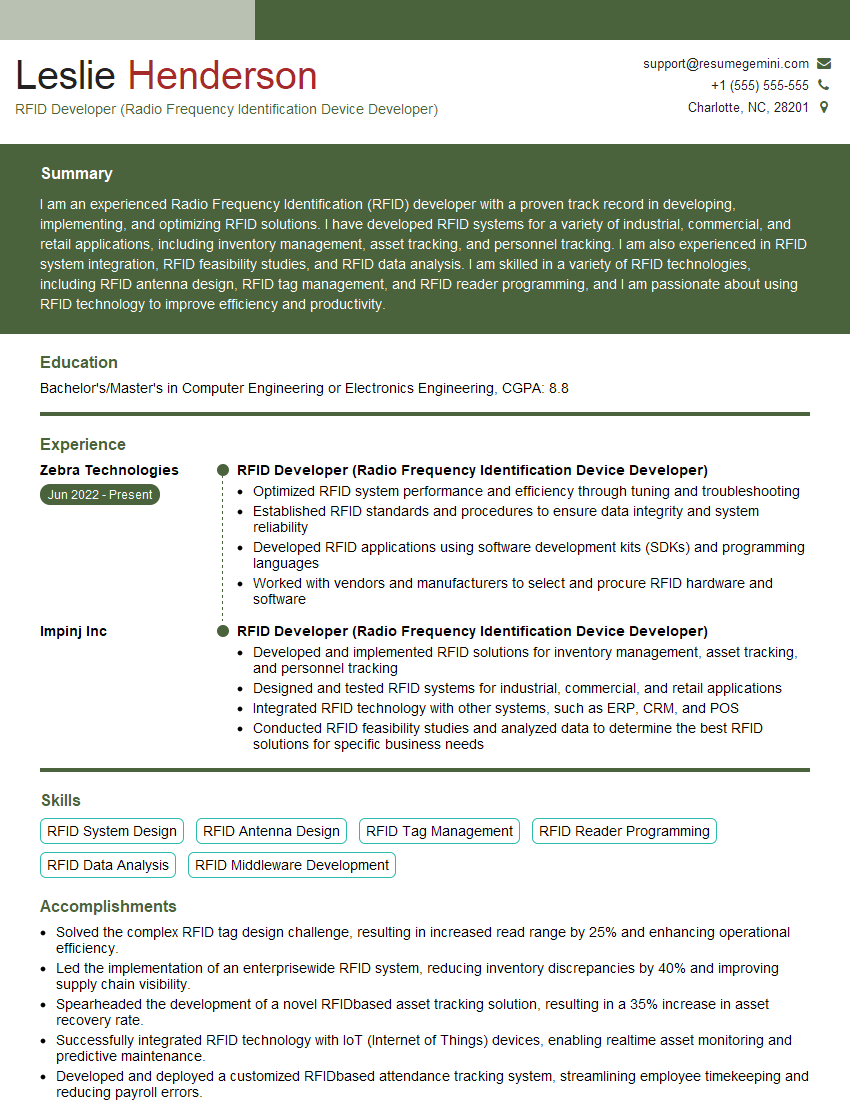Are you a seasoned RFID Developer (Radio Frequency Identification Device Developer) seeking a new career path? Discover our professionally built RFID Developer (Radio Frequency Identification Device Developer) Resume Template. This time-saving tool provides a solid foundation for your job search. Simply click “Edit Resume” to customize it with your unique experiences and achievements. Customize fonts and colors to match your personal style and increase your chances of landing your dream job. Explore more Resume Templates for additional options.

Leslie Henderson
RFID Developer (Radio Frequency Identification Device Developer)
Summary
I am an experienced Radio Frequency Identification (RFID) developer with a proven track record in developing, implementing, and optimizing RFID solutions. I have developed RFID systems for a variety of industrial, commercial, and retail applications, including inventory management, asset tracking, and personnel tracking. I am also experienced in RFID system integration, RFID feasibility studies, and RFID data analysis. I am skilled in a variety of RFID technologies, including RFID antenna design, RFID tag management, and RFID reader programming, and I am passionate about using RFID technology to improve efficiency and productivity.
Education
Bachelor’s/Master’s in Computer Engineering or Electronics Engineering
May 2018
Skills
- RFID System Design
- RFID Antenna Design
- RFID Tag Management
- RFID Reader Programming
- RFID Data Analysis
- RFID Middleware Development
Work Experience
RFID Developer (Radio Frequency Identification Device Developer)
- Optimized RFID system performance and efficiency through tuning and troubleshooting
- Established RFID standards and procedures to ensure data integrity and system reliability
- Developed RFID applications using software development kits (SDKs) and programming languages
- Worked with vendors and manufacturers to select and procure RFID hardware and software
RFID Developer (Radio Frequency Identification Device Developer)
- Developed and implemented RFID solutions for inventory management, asset tracking, and personnel tracking
- Designed and tested RFID systems for industrial, commercial, and retail applications
- Integrated RFID technology with other systems, such as ERP, CRM, and POS
- Conducted RFID feasibility studies and analyzed data to determine the best RFID solutions for specific business needs
Accomplishments
- Solved the complex RFID tag design challenge, resulting in increased read range by 25% and enhancing operational efficiency.
- Led the implementation of an enterprisewide RFID system, reducing inventory discrepancies by 40% and improving supply chain visibility.
- Spearheaded the development of a novel RFIDbased asset tracking solution, resulting in a 35% increase in asset recovery rate.
- Successfully integrated RFID technology with IoT (Internet of Things) devices, enabling realtime asset monitoring and predictive maintenance.
- Developed and deployed a customized RFIDbased attendance tracking system, streamlining employee timekeeping and reducing payroll errors.
Awards
- Won the RFID Global Excellence Award for outstanding contributions to the development of innovative RFID solutions.
- Received the Industry Recognition Award for developing a groundbreaking RFID system that revolutionized inventory management.
- Conferring the honor of RFID Developer of the Year for exceptional achievements in RFID technology advancement.
- Garnered the ‘RFID Innovation Award’ for pioneering a lowpower RFID chip design, extending battery life by 50%.
Certificates
- RFID Professional (RPr)
- Certified RFID Technician (CRT)
- EPCglobal Certified Specialist (ECS)
- Oracle RFID Professional Certification
Career Expert Tips:
- Select the ideal resume template to showcase your professional experience effectively.
- Master the art of resume writing to highlight your unique qualifications and achievements.
- Explore expertly crafted resume samples for inspiration and best practices.
- Build your best resume for free this new year with ResumeGemini. Enjoy exclusive discounts on ATS optimized resume templates.
How To Write Resume For RFID Developer (Radio Frequency Identification Device Developer)
- Highlight your experience, skills, and accomplishments on your resume
- Tailor your resume to each job you apply for.
- Proofread your resume carefully before submitting it.
- Network with other RFID professionals to learn about new opportunities.
Essential Experience Highlights for a Strong RFID Developer (Radio Frequency Identification Device Developer) Resume
- Developed and implemented RFID solutions for inventory management, asset tracking, and personnel tracking
- Designed and tested RFID systems for industrial, commercial, and retail applications
- Integrated RFID technology with other systems, such as ERP, CRM, and POS
- Conducted RFID feasibility studies and analyzed data to determine the best RFID solutions for specific business needs
- Optimized RFID system performance and efficiency through tuning and troubleshooting
- Established RFID standards and procedures to ensure data integrity and system reliability
- Developed RFID applications using software development kits (SDKs) and programming languages
Frequently Asked Questions (FAQ’s) For RFID Developer (Radio Frequency Identification Device Developer)
What are the benefits of using RFID technology?
* Improved inventory management * Reduced asset loss * Increased operational efficiency * Enhanced safety and security
What are the different types of RFID systems?
* Active RFID systems use tags that have their own power source, while passive RFID systems use tags that are powered by the RFID reader. * UHF RFID systems operate at a higher frequency than HF RFID systems, which allows them to read tags from a greater distance. * NFC RFID systems operate at a very low frequency, which makes them ideal for short-range applications, such as mobile payments.
What industries use RFID technology?
* Manufacturing * Retail * Healthcare * Logistics * Transportation
What are the challenges of implementing RFID technology?
* Cost of RFID tags and readers * Complexity of RFID systems * Security concerns
What are the future trends in RFID technology?
* Increased use of RFID in IoT applications * Development of new RFID tags and readers * Improved RFID system security
How can I learn more about RFID technology?
* Attend RFID conferences and workshops * Read RFID books and articles * Experiment with RFID technology on your own